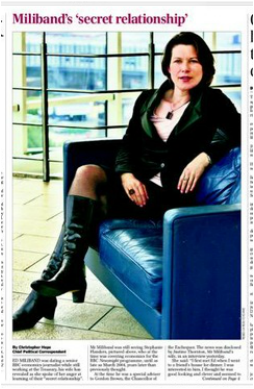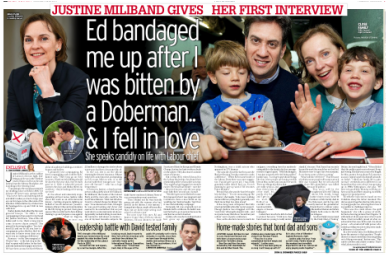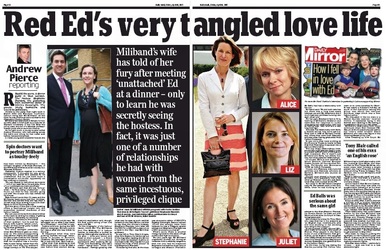Voters don't want to know about politicians' domestic arrangements. They have no interest in their wives or their kitchens, according to a ComRes poll published in the Daily Mail today.
We have certainly had a lot of kitchens in this campaign. So maybe it's time to give them a rest.
The wives are less likely to be left in peace. Newspapers would struggle if they couldn't report on their dress sense, their eating habits and even their opinions. Yesterday, for example, we had Miriam González Durántez accusing the Prime Minister of living in a bubble, and Justin Thornton describing how she fell in love with Ed Miliband.
We have certainly had a lot of kitchens in this campaign. So maybe it's time to give them a rest.
The wives are less likely to be left in peace. Newspapers would struggle if they couldn't report on their dress sense, their eating habits and even their opinions. Yesterday, for example, we had Miriam González Durántez accusing the Prime Minister of living in a bubble, and Justin Thornton describing how she fell in love with Ed Miliband.
They had been leafleting together, she told the Mirror. She had put her hand through a letterbox and had it bitten by a dog on the other side. "Ed bandaged me up and I fell in love with him."
This isn't, however, the story that the Mail and Telegraph have focused on today. They are far more interested in Thornton's first encounter with Miliband the previous year. Here's how she described it to the Mirror's Ros Wynne Jones:
This isn't, however, the story that the Mail and Telegraph have focused on today. They are far more interested in Thornton's first encounter with Miliband the previous year. Here's how she described it to the Mirror's Ros Wynne Jones:
I first met Ed when I went to a friend’s house for dinner. I was interested in him, I thought he was good looking and clever and seemed to be unattached. But we just went down a conversational cul-de-sac.
Apparently we had nothing in common. He wanted to talk about economics – one of my least favourite subjects. He didn’t know my friend Adrian. None of our conversations went anywhere.
Then I found out he was secretly going out with the woman who had invited us for dinner. I was furious.
Who is this friend Adrian? Had he been her partner at this dinner party? What is the point of him to this story?
Why was she furious? Because a man she had never met before - a man who didn't seem particularly interested in her or her choice of conversation - was involved with her hostess friend?
Was she furious with him because he didn't interrupt a conversation about economics to say "by the way, I'm going out with Stephanie". Was she furious with Stephanie for not mentioning the secret relationship?
Or was she perhaps furious because she thought she might have made a fool of herself by making a play for a man who wasn't available?
Why was she furious? Because a man she had never met before - a man who didn't seem particularly interested in her or her choice of conversation - was involved with her hostess friend?
Was she furious with him because he didn't interrupt a conversation about economics to say "by the way, I'm going out with Stephanie". Was she furious with Stephanie for not mentioning the secret relationship?
Or was she perhaps furious because she thought she might have made a fool of herself by making a play for a man who wasn't available?

The dinner party hostess was, as John Rentoul tweeted yesterday, Stephanie Flanders, who was at that time Newsnight's economics editor. This is dynamite for the Telegraph, which points out that Miliband was then working at the Treasury as a special adviser to Gordon Brown.
But, rather like that dinner party conversation, the paper finds itself going down a cul-de-sac. Flanders declines to comment. The Cabinet Office says there is no requirement for special advisers to declare their relationships with journalists [as opposed to ministers and soldiers who must now seek permission before consorting with people practising our grubby trade - but that's another matter]. So that just leaves the BBC guidelines on how it is sometimes a good idea to declare the political activities of close personal contacts. But the BBC won't tell the Telegraph whether Flanders disclosed her relationship with Miliband, so the story comes to a dead end.
But, rather like that dinner party conversation, the paper finds itself going down a cul-de-sac. Flanders declines to comment. The Cabinet Office says there is no requirement for special advisers to declare their relationships with journalists [as opposed to ministers and soldiers who must now seek permission before consorting with people practising our grubby trade - but that's another matter]. So that just leaves the BBC guidelines on how it is sometimes a good idea to declare the political activities of close personal contacts. But the BBC won't tell the Telegraph whether Flanders disclosed her relationship with Miliband, so the story comes to a dead end.
For Andrew Pierce in the Mail, there is a much juicier trail to follow. To him, that West London dinner party in March 2004 "offers a fascinating insight into the somewhat caddish character of the Labour leader".
For, not only did he knife his elder brother in the back by ending his dream of getting the Labour leadership by standing against him (contrary to the wishes of their mother), but he met his future wife Justine (albeit unwittingly) at that dinner party hosted by his then girlfriend.
Who knew (apart from Michael Fallon, of course) that the Labour party leadership was in the gift of Mrs Miliband senior?
And I may be thick, but I'm struggling to see what is caddish about having a dinner party conversation. There is no evidence that Miliband was flirting with Thornton. Rather, her own description suggests that she was the one who was smitten - a perception reinforced by a biography extract quoted by Pierce:
And I may be thick, but I'm struggling to see what is caddish about having a dinner party conversation. There is no evidence that Miliband was flirting with Thornton. Rather, her own description suggests that she was the one who was smitten - a perception reinforced by a biography extract quoted by Pierce:
Although she was struck by his eyes — wide and brown and fixed on their subject — a friend remembers her undoubted excitement after meeting Ed as: 'Gosh, how fascinating, he's really clever', rather than: 'Gosh, how handsome'.
Pierce is not to be deflected, however. He notes that the "Labour-supporting" Mirror, "perhaps glossing over what may be seen as caddish behaviour, omitted to mention that the hostess was then Miliband's girlfriend".
In giving the interview - which appeared under a "simpering" headline - Thornton had clearly been guided by Labour spin-doctors "who wanted to give the impression to voters that her husband was a touchy-feely human being, rather than the soulless nerd that his awkward image conveys on TV".
Miliband is further attacked as being "ungallant" for having "blurted out" two years ago that Ed Balls had also once been involved with Flanders.
Pierce then goes on to list three other women with whom he says Miliband had been linked romantically: the daughter of a political economist, an aide to Gordon Brown and a former Times journalist.
Miliband would have been 36 at the time of that dinner party. Does having three ex-girlfriends by that age constitute a "tangled love life"?
Of course not. Nor can Pierce really think that. What interests him is the Labour network. Ed Balls met Flanders at Harvard, when he was 22. His future wife Yvette Cooper was, like Flanders, a Kennedy scholar there. Miliband also went to Harvard. All four had been to Oxford.
The former Times journalist who once "briefly" dated Miliband also "had a fling" with her then colleague, Tom Baldwin, who is now the Labour leader's chief spin-doctor.
The way the relationships intertwine shows, according to Pierce, "the deeply incestuous and narrow world of the Labour high command". This, he argues, is further demonstrated by links between the other women mentioned and the Labour party, leading him to conclude:
In giving the interview - which appeared under a "simpering" headline - Thornton had clearly been guided by Labour spin-doctors "who wanted to give the impression to voters that her husband was a touchy-feely human being, rather than the soulless nerd that his awkward image conveys on TV".
Miliband is further attacked as being "ungallant" for having "blurted out" two years ago that Ed Balls had also once been involved with Flanders.
Pierce then goes on to list three other women with whom he says Miliband had been linked romantically: the daughter of a political economist, an aide to Gordon Brown and a former Times journalist.
Miliband would have been 36 at the time of that dinner party. Does having three ex-girlfriends by that age constitute a "tangled love life"?
Of course not. Nor can Pierce really think that. What interests him is the Labour network. Ed Balls met Flanders at Harvard, when he was 22. His future wife Yvette Cooper was, like Flanders, a Kennedy scholar there. Miliband also went to Harvard. All four had been to Oxford.
The former Times journalist who once "briefly" dated Miliband also "had a fling" with her then colleague, Tom Baldwin, who is now the Labour leader's chief spin-doctor.
The way the relationships intertwine shows, according to Pierce, "the deeply incestuous and narrow world of the Labour high command". This, he argues, is further demonstrated by links between the other women mentioned and the Labour party, leading him to conclude:
What a deliciously small and privileged world! One that is a million miles from the lives of millions of ordinary voters.
A deeply incestuous and narrow world, indeed.
Nothing like the Eton old boy network.
Nothing like Cameron's world of "country suppers" with Rebekah Brooks, who once had a relationship with Andy Coulson, who went on to become the Conservative leader's chief spin-doctor.
Nothing like the Bullingdon Club set of Cameron, Osborne, Boris, Nat Rothschild et al.
Not to mention their fellow Oxford alumnus Michael Gove, who is married to Mail columnist Sarah Vine.
We can all play this game. People tend to mix with like-minded people, to form strong friendships and relationships at university, and to marry within their set. It's called life.
As to tangled love lives: glass houses; stones.
Footnote: All in it together Pierce, Baldwin, Gove, Vine and Miliband's journalist ex-girlfriend all worked at The Times. So did I. A Blair speech-writer also mentioned in the Mail article still does.
Nothing like the Eton old boy network.
Nothing like Cameron's world of "country suppers" with Rebekah Brooks, who once had a relationship with Andy Coulson, who went on to become the Conservative leader's chief spin-doctor.
Nothing like the Bullingdon Club set of Cameron, Osborne, Boris, Nat Rothschild et al.
Not to mention their fellow Oxford alumnus Michael Gove, who is married to Mail columnist Sarah Vine.
We can all play this game. People tend to mix with like-minded people, to form strong friendships and relationships at university, and to marry within their set. It's called life.
As to tangled love lives: glass houses; stones.
Footnote: All in it together Pierce, Baldwin, Gove, Vine and Miliband's journalist ex-girlfriend all worked at The Times. So did I. A Blair speech-writer also mentioned in the Mail article still does.







 RSS Feed
RSS Feed


